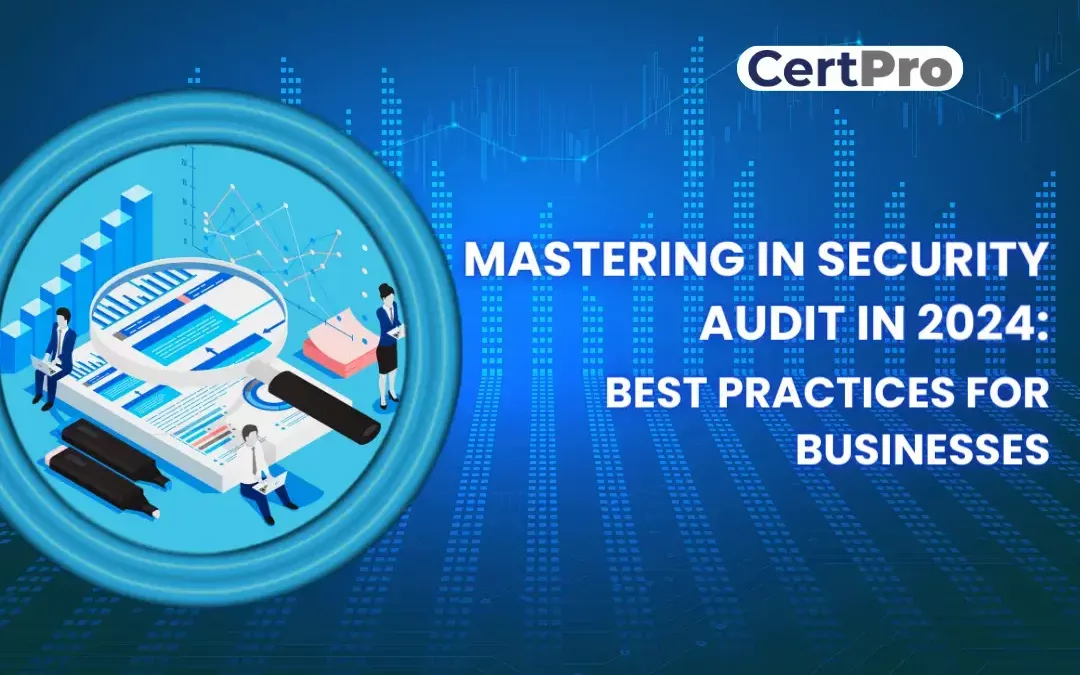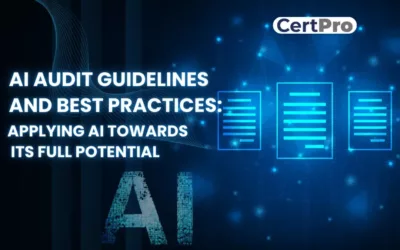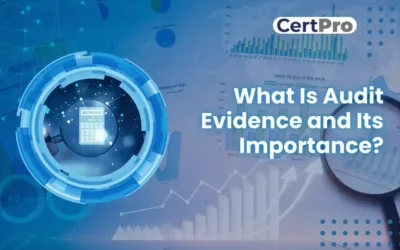A security audit is essential for companies to maintain robust information security controls. Therefore, audits become more relevant as the number of incidents of data breaches increases. A study suggested that, from 2021 to 2022, the average cost of data breaches that affected the companies increased from $4.25 million to $4.35 million. Thus, audits can help identify the vulnerabilities and assess the effectiveness of the existing controls.
This article will discuss security audits and their benefits in this fragile web environment. It will also discuss the relevance of audits to controlling and managing unwanted threats and data breaches. It is necessary to organize periodic security audits to evaluate its security measures.
WHAT IS A SECURITY AUDIT?
A security audit systematically assesses an organization’s information security framework. It evaluates the effectiveness of existing security controls and recognizes potential threats. In addition, the auditing process assesses the organization’s compliance with existing rules and standards. In this regard, an audit process reviews the organization’s IT infrastructure and analyzes the policies and employee training procedures. Therefore, implementing the policies or becoming compliant does not ensure the security aspect of the organization. The key component is following a periodic safety audit process to assess the vulnerabilities and scope of improvement.
At CertPro, we streamline the security audit process with expert supervision and guidance. Our team will evaluate the efficacy of the existing security protocol and determine the gaps. Therefore, collaborate with CertPro to strengthen your security controls.
WHAT ARE THE TYPES OF SECURITY AUDITS?
It can be classified into three types, depending on their scope and entities:
Internal Audits: Typically, members of the organization’s internal team conduct internal audits. If your organization has an independent audit department, they can perform the audits. As a result, those who are not directly in charge of the audited areas within the organization can carry it out.
Second-Party Security Audits: The affiliated external organization or partners execute second-party audits. Thus, this is expected before signing business relationships or contracts. The vendor or partners can conduct the audits to recheck the security controls.
External Security Audits: Independent organizations or auditing firms conduct security audits without directly linking with the audited organization. These audits aim to assess the security controls from an external perspective, identifying vulnerabilities and weaknesses compared to the real world.
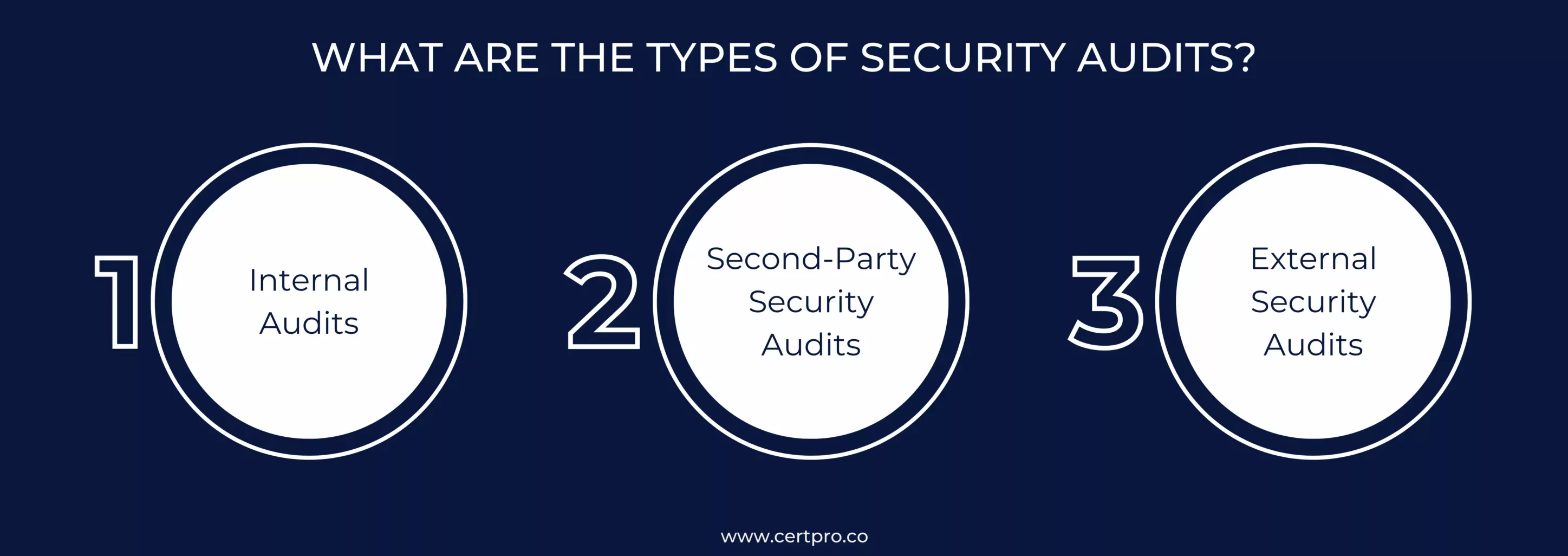
WHY ARE SECURITY AUDITS IMPORTANT FOR YOUR ORGANIZATION?
Implementing controls doesn’t ensure cybersecurity. Thus, an audit is necessary to comply with compliance.
1. Checking Compliance: A security audit ensures that your organization adheres to relevant controls per industry demands. In addition, the audit evaluates your organization’s compliance and exhibits the controls’ significance in protecting data and risk mitigation. Simply put, it verifies your organization’s compliance status and recommends suggestions for preventing threats.
2. Creating Resiliency to Future Attacks: Audits specify the weaknesses of the current security controls and advise recommendations for improvement. In addition, the process strengthens your organization’s defense mechanism and deters potential threats. Suppose a healthcare organization applies an information security framework to secure patient data. The audit might find out the lack of encryption in the data storage system. It might risk data security. Thus, audit best practices to identify areas for improvement in the security process.
3. Improving Security Posture: It discloses new vulnerabilities in your existing controls and helps improve the organization’s security. Imagine an audit of a financial organization to identify data security risks. The audit suggested that the organization uses outdated firewalls and inadequate segmentation, which risks data security. Therefore, the organization can upgrade its system configuration and prevent unauthorized access to data.
4. Enhancing Client Trust: An audit ensures that your organization follows safety and security regulations. Hence, the organization considers data security a priority. These instances increase the organization’s acceptability and trust. Customers and service providers can develop professional trustworthiness and long-term commitment.
5. Mitigating the Risk: A security audit’s best practices determine the vulnerabilities and liabilities of the organization. It helps the organization implement proactive measures to avoid the risk. Therefore, the risk of data breaches and financial difficulties is eliminated.
6. Providing Competitive Advantage: A successful audit secures the organization’s data and ensures its commitment to data security and privacy. Thus, it provides a competitive advantage over competitors. In addition, it can allow you to collaborate with larger organizations and grab the attention of potential customers.
HOW TO CONDUCT A SECURITY AUDIT FOR YOUR ORGANIZATION?
A security audit can be achieved by following these steps:
Determining the Assets: You must recognize your organization’s critical assets that require protection. These can be IT equipment, network devices, software applications, client data, or organization data. Therefore, your organization’s assets depend on the industry and its security posture. Suppose your organization works in the healthcare industry; your priority will be protecting your patient’s data. On the other hand, a financial organization might prioritize their client’s transaction-related data. As an auditor, it is essential to understand the priority of assets and incorporate that concern into the security audit. Therefore, selecting appropriate elements is also crucial for a successful audit. An auditor decides on factors like the operational process’s criticality and alignment with the organization’s priorities. Thus, the auditing process can help you evaluate the efficacy of overall controls.
Finding Potential Threats: Security audits require a comprehensive list of potential threats to the organization. Potential threats can be anything that causes substantial damage to the organization and its functioning, including data breaches, phishing attacks, ransomware attacks, and insider threats. In the present scenario, cyberattacks are your organization’s most common and costly threats. Thus, audits check for malicious attempts at Distributed Denial of Service (DDoS). Furthermore, they find ransomware attacks, where hackers encrypt your data and demand money for decryption. The process helps your organization recognize threats and seal the gaps to prevent them.
Assessing Staff Training: A data breach investigation report by Verizon in 2022 suggested that 82% of data breaches are linked to human error. This means that employees of the organizations are unable to recognize the potential threats or accidentally initiate the data violation. It is a common incident in several organizations handling sensitive data. Therefore, a security audit’s best practices ensure that your organization’s employees understand the data handling process. The organization should also maintain a staff record of those handling and managing sensitive data. In addition, the audit process allows future training sessions for employees to upgrade their skills.
Assigning Audit Consultant: A qualified security audit consultant is required for an unbiased third-party assessment. You can consider CertPro as an audit consultant for your organization. Therefore, an external auditor can assess your organization’s compliance requirements according to industry standards. CertPro can guide and help you in this respect, as our experts have mastered the field of auditing. We assure you that our security checking process will help you perform well.
Conducting Security Audit: A security audit thoroughly examines your organization’s security controls. The result can make your compliance more relevant and practical. Thus, an audit is considered a process to recheck your organization’s functionalities in preventing data breaches. Therefore, organizations must conduct an external audit periodically to maintain data security. The frequency of the audits depends on the size and scope of the organization. However, an audit is mandatory once a year to continue compliance and avoid the risk of data violations.
Audit Report: After completing the audit, the auditor will create a detailed report outlining the vulnerabilities and making recommendations. The audit report will undoubtedly help your organization find gaps in controls. Therefore, implementing the recommended changes can strengthen your organization’s security concerns.
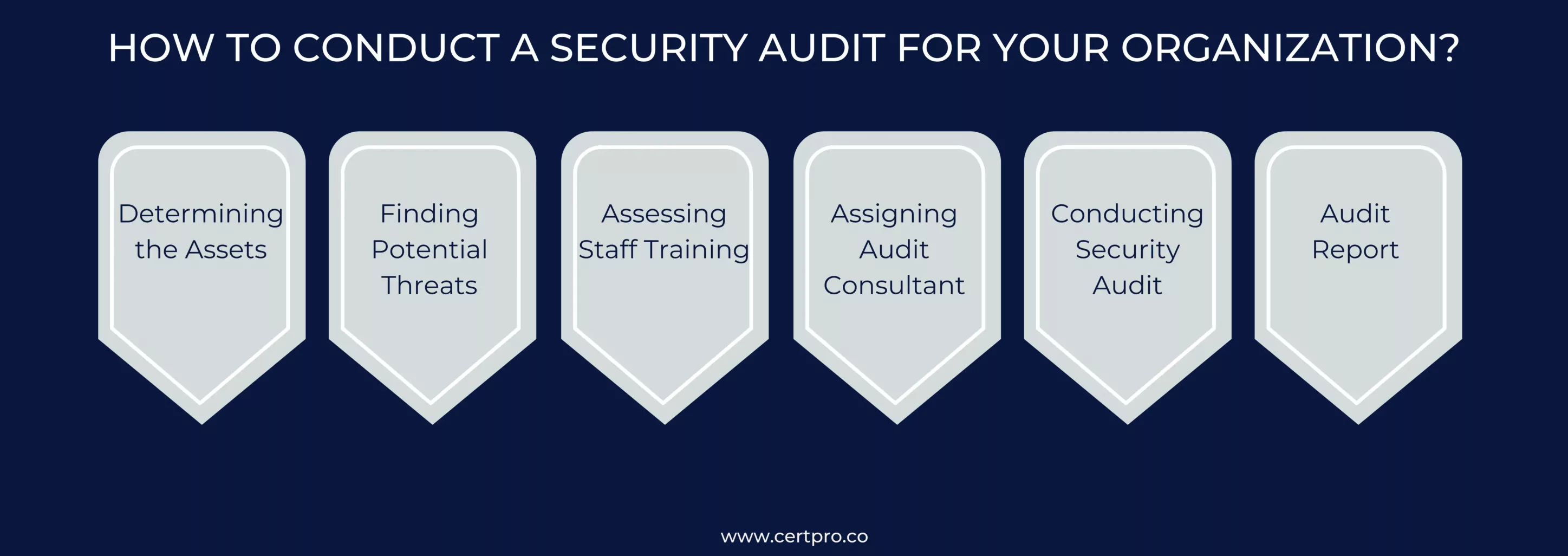
WHAT ARE THE BEST PRACTICES FOR SECURITY AUDITS?
Incorporate some practice into your audit process:
Regular Internal Security Assessments: Your organization’s internal auditors can practice regular auditing processes to identify vulnerabilities and gaps in controls. Thus, it improves the overall threat mitigation process. It will help your organization find the weaknesses of executed controls that risk data security. In addition, regular internal security monitoring also ensures that your organization follows the proper policies and procedures per company standards.
Executing a Comprehensive Security Framework: A robust security framework is essential for maintaining industry standards. You must choose an information security framework for your organization based on the industry’s demands. Therefore, a dedicated security framework for data security ensures the organization’s proper functioning. It considers different controls to secure your organization’s operational process.
Documenting and Maintaining Security Policies: Documenting implemented policies and procedures is essential, as it provides clear guidelines for employees. Therefore, documentation also helps in the external auditing process. It confirms that your organization is constantly following the procedure for securing its data. Furthermore, employees understand the organization’s operational procedures and approaches.
Establishing Incident Response: Organizations must have response and recovery plans. These plans can inform employees about their action plans during a disaster. They ensure your organization’s response process during cyberattacks. The employees have specific guidelines about their respective actions in crises, which helps the organization function swiftly.
HOW TO IMPLEMENT SUCCESSFUL CLIENT SECURITY AUDITS?
A successful audit requires the following tips:
Effective Communication and Collaboration: Transparent communication and collaboration confirm a successful security audit. It requires cooperation and support from both parties. The auditor should have sufficient knowledge and capabilities to handle the complex audit process. In addition, the organization must have a quick response system to provide necessary documents and assistance. Therefore, positive collaboration helps both parties function smoothly and enjoy the experience.
Comprehensive Documentation and Evidence Collection: Organizations must have a substantial documentation procedure for their policies and controls. Additionally, they must record evidence of their implemented compliance controls. This helps assess the efficacy of controls regarding trust service criteria. Therefore, well-documented procedures help the external auditor understand the whole process and evaluate its effectiveness.
Conducting Pre-Audit Self-Assessments: Self-assessment consistently improves your organization’s data security posture. Thus, internal audits should be performed regularly to recognize procedures’ flaws and work on improving the process. If your organization has a limited scope for internal audits, you can select auditing firms like CertPro, which can work on your behalf to assess and address vulnerabilities.
FINAL THOUGHTS
Mastering security audits requires a proactive approach. It is a commitment to the clients to guarantee their security posture. Therefore, systematic audits enable us to find organizations’ threats and susceptibilities. In addition, the process assures the organization that its security controls effectively manage threats. Thus, it increases trust and confidence among the clients and stakeholders of your organization. In this fast-evolving digital landscape, new threats emerge regularly. Therefore, security audits have become more pertinent and applicable for organizations securing data.
FAQ
What does a security audit consist of?
Planning, preparation, testing, and reporting are the steps that follow a security audit process. However, it is a complex process that requires expert intervention for better results.
How will a security audit help in your business?
A cybersecurity audit helps businesses assess the effectiveness of their security measures. It also identifies vulnerabilities and system gaps and ensures compliance with industry standards.
What is the primary objective of a security audit?
A security audit evaluates the adequacy and effectiveness of your organization’s security controls and determines their vulnerability or non-compliance. In addition, it provides recommendations for improvement.
Is a security audit an expensive process?
It depends on the size and complexity of the organization. However, implementing new controls or encountering data breaches can cause substantial financial losses for your organization compared to following the regular audit process.
How can CertPro help you in this regard?
CertPro has a dedicated auditing team. They can guide and audit your organization’s controls and help you strengthen their efficacy. Contact us or visit our site for more details.

About the Author
SHREYAS SHASTHA DRUPADHA
Shreyas Shastha Drupadha, a Senior Business Consultant. Serving as an ISO 27001 Lead Auditor, Shreyas ensures the establishment of robust information security management systems. His expertise also encompasses GDPR, HIPAA, CCPA, and PIPEDA implementation.
AI Audit Guidelines and Best Practices: Applying AI Towards Its Full Potential
Artificial Intelligence is entering different industries, where it is used for customer handling, data management, and documentation processes. The interference of AI is increasing concerns regarding ethical practice and safety. Therefore, AI audits have become more...
AUDIT LOG: INFORMATION SECURITY BEST PRACTICES FOR BUSINESSES
An audit log is the best information security practice for organizations. This article elaborates on the operational process of audit logs and how companies utilize them for business growth. What is an audit log, and how does it work for organizations? For more...
WHAT IS AUDIT EVIDENCE AND ITS IMPORTANCE?
The foundation of assurance in the ever-changing world of finance is audit evidence, which emphasizes openness and trust. It provides regulatory agencies, investors, and stakeholders with a trustworthy road map to help them navigate the complex labyrinth of financial...

